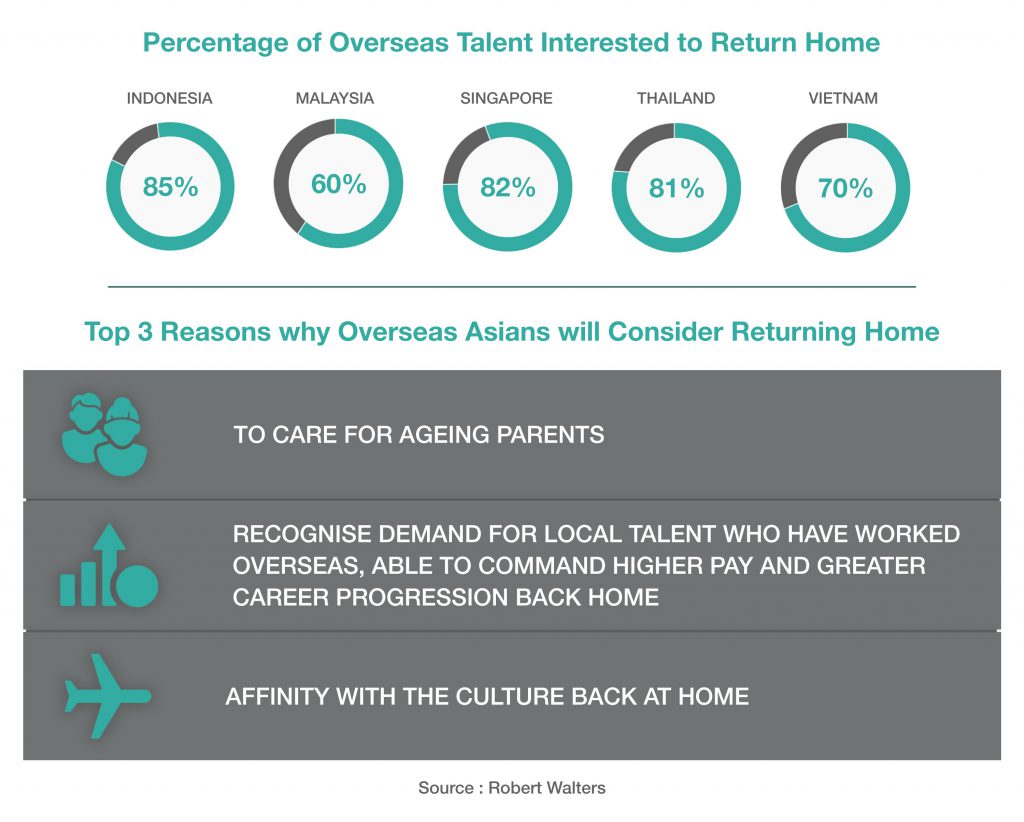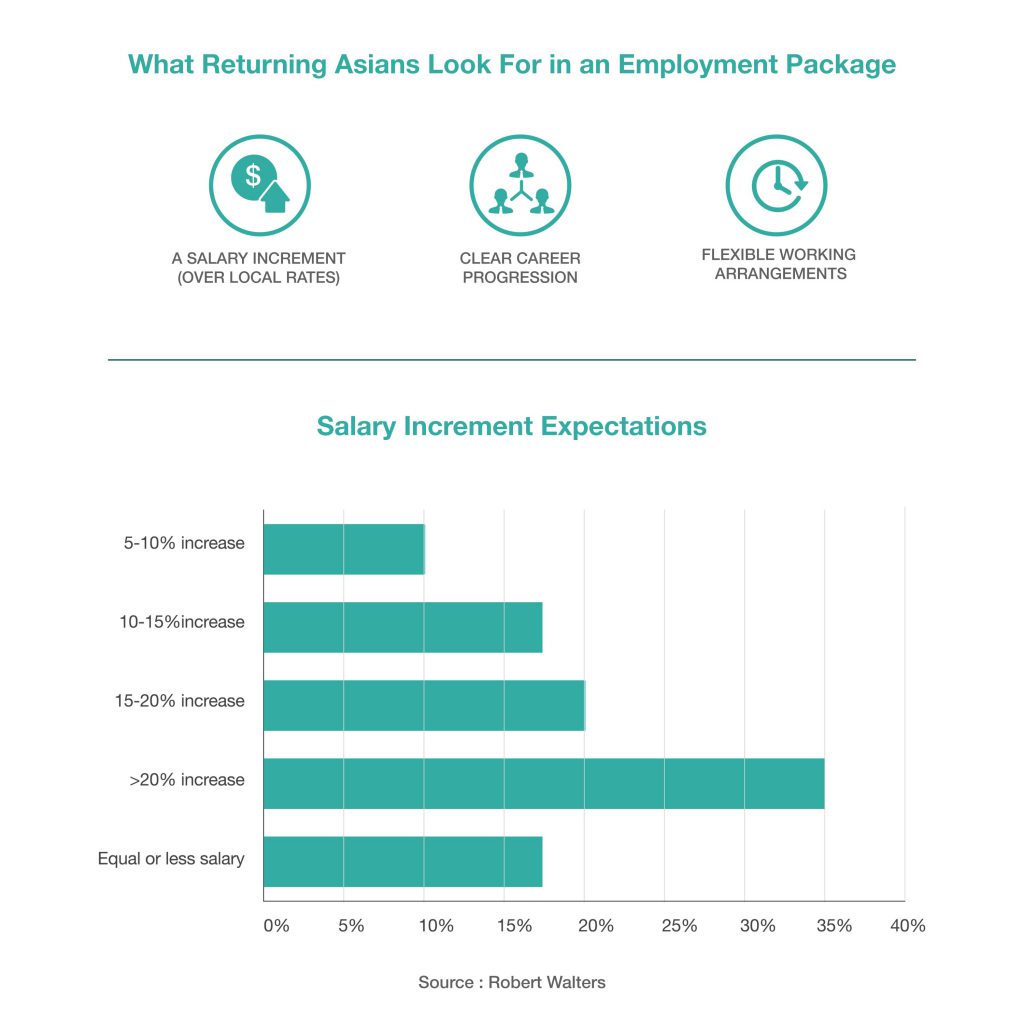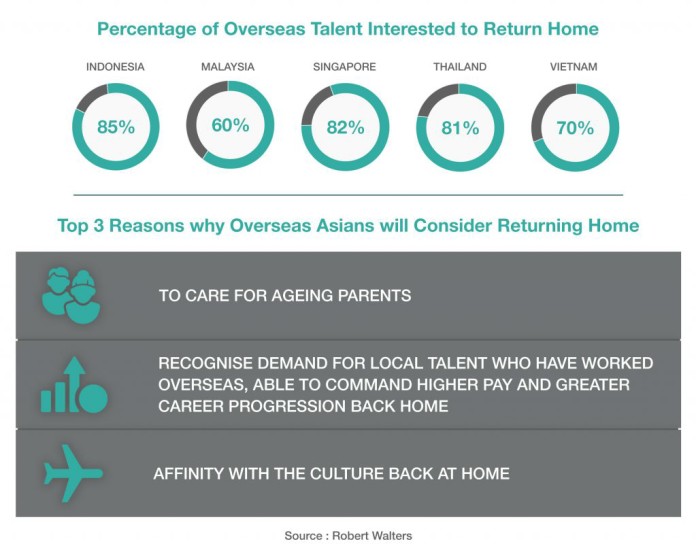GOVERNMENTS in Southeast Asia looking for ways to plug the talent leak in their respective countries can rest assured that the so-called skilled labor shortage pandemic in the region is not the result of a permanent refusal of graduates to return home.
Quite the contrary, as this recent Robert Walters whitepaper found, the majority of those earning a living abroad would actually prefer finding employment back in their home countries.
The whitepaper titled, “Return of the Asian talent” that focuses on overseas workers from Indonesia, Malaysia, Singapore, Thailand and Vietnam said the top three reasons for this are: To care for ageing parents; because workers recognize the demand for local talent with overseas experience and understand they are able to command higher pay; and their affinity with the culture back home.
According to the recruitment consultancy’s findings, there was approximately 4 million Vietnamese working abroad as of September 2015, 1.4 million Malaysians as of 2009, 429,872 Indonesians as of 2014, 212,500 Singaporeans as of June 2015 and 148,240 Thais according to numbers from June 2015.
Of these, an average of 75.6 percent of professionals want to return home. The breakdown in the survey says this is true for 85 percent Indonesians, 82 percent Singaporeans, 81 percent Thais, 70 percent Vietnamese and 60 percent Malaysians.

SEE ALSO: Global Talent Competitiveness Index highlights ASEAN’s disparity
In its foreward, Robert Walters labelled this an “exciting time for Southeast Asia”.
The firm noted that the region has seen rapid economic progression in recent years and as such, is facing a growing shortage of white-collared professionals, especially in emerging markets like Indonesia, Thailand and Vietnam.
“As multinational companies expand into these countries, there is a strong demand for business-savvy talent with bilingual abilities and global mindsets,” it said.
But though the numbers suggest that luring local talent back home would be like shooting fish in a barrel – especially since most want to come home anyway – the whitepaper said 88 percent of hiring managers polled in Southeast Asia are having trouble with recruitment.
To get from brain drain to brain gain, Robert Walters said it is important for employers to understand the key concerns of these prospective “returning Asians” and what to do to get them to accept employment back home.
SEE ALSO: Malaysia’s brain drain
“Returning Asians have an edge, one that comprises a global mindset and an in-depth understanding of the local culture.
“How hiring managers can effectively attract them home will depend on their understanding of what these returning Asians want,” the firm said.
From its findings, Robert Walters said “returning Asians” are looking for salary increments, clear career progression and flexible working arrangements, among others.
The expectations wary, the firm said, but at least 35 percent feel they their salaries should be bumped by more than 20 percent. About 17.5 percent, on the other hand, are willing to accept employment back home for the same salary or even take a pay cut.
“Hiring managers will need to strike a balance between budgetary constraints and hiring the right candidates.
“It will be useful to weigh the cost of hiring versus not hiring; not hiring the right candidate due to initial cost savings may prove to have a greater adverse impact on the business in the long run,” said Toby Fowlston, managing director of Robert Walters Southeast Asia.
SEE ALSO: Singapore companies risk brain drain
The whitepaper said the top three concerns of overseas Asians thinking of returning home are: fears of less work-life balance or poorer quality of life; their ability (or inability) to assimilate back into the culture due to the length of time away; and underdeveloped infrastructure and public transportation.
To temper these concerns, however, the overseas Asians surveyed said there are things their prospective employers could do, such as: offer an attractive salary increment (32 percent); offer holistic employment packages and benefits (30 percent); and map out a clear career progression path (12 percent).

“The little things go a long way in showing returning Asians that they are working for a company that values its employees beyond the bottom line,” said Gerrit Bouckaert, country manager of Robert Walters Thailand and Vietnam.
According to this 2014 report on “reverse migration” by the Asia Pacific Foundation of Canada, in recent years, many Asian countries like India and China have committed significant financial resources to lure back some of their best talent from abroad to fill the employment gaps back home.
Among others, returning talents are offered incentives like better paid jobs, high socioeconomic statuses and talent growth.
In Malaysia, for example, the Economic Transformation Programme launched in 2010 expressly addressed the shortage of professionals and technical experts in the country, and trotted out initiatives aimed at luring talents home to fuel the local workforce.
“Vietnam, for instance, is estimating to have spent over $7 million. The various policy changes include tax incentives, financial compensation, increasing the number of international schools, and reforms to visa and permanent residency requirements.
“The trend of reverse migration will likely assist Asia’s efforts to recruit and retain talent,” the Asia Pacific Foundation’s report said.
The post Most Southeast Asians working abroad want to come home and here’s why appeared first on Asian Correspondent.





